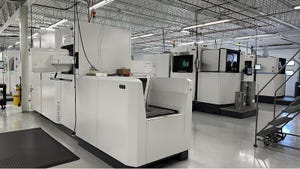December 4, 2009

Today's global manufacturing operations run 24/7, requiringexact replication of products and processes in all regional settings. To remainprofitable providing competitive products and services, any operation mustmaximize uptime and productivity while ensuring dependability and quality. Inaddition, regardless of industry or marketplace, industrial applicationsrequire flexible manufacturing systems that enhance reliability whileminimizing downtime. Given the challenges in this global competition, only themost disciplined manufacturing operations can survive, largely by followingproven manufacturing practices that deliver high quality, reliable productswithin cost effective environments.
Operating within these challenging market conditions, designengineers cite numerous criteria when selecting motors across a broad range ofapplications. Design decisions may turn on a single (or combination ofmultiple) criteria such as cost, torque, speed and power, reliability anddurability, unit size, space utilization and installation hindrances, heatdispersion and temperature control, energy efficiency along with noise levelsand adherence to project specifications and requirements.
Partnersin Success
In one unique design challenge, Asten, a Brazilian manufacturer,sought a motor worthy of its ambitious plans to develop new products for the dental,agricultural, fitness and medical markets. After rigorous vendor review, thecompany asked Bosch's Industrial Business division to deliver the CEP motorF006.WM0.310. Their decision was basedon superior product performance and the suppliers breadth and depth ofengineering support. Working together, the partners assembled dual engineeringteams and developed exacting technology to further refine the CEP motor in alinear actuator assembly designed to drive dental chair position according to customerspecifications.
Together Asten and Bosch engineering teams developed alinear actuator assembly composed of Bosch's DC electric motor (24V DC), aspindle and a drive bushing. The actuator was tested and approved for 6.000 Nmor 600 Kg. This DC motor (F006.WM0.310) is the most robust DC motor in the CEPfamily, with 48 Nm at 45 RPM. After final operational verification testing wascomplete, the linear actuator assembly was sold to regional and global markets confirmingsuperior operation.
Based upon initial success in penetrating new markets withthe dental chair, the partners decided to explore other possible applicationsfor DC motors. Under joint design and development, the CEP motor was integratedinto Asten manufacturing operations, to enable the creation of new productshousing a DC motor improving performance across a new set of medical, fitnessand dental applications. Further success has been realized through the developmentof an expanding product line including: adjustable hospital beds, surgicaltables, mats for cardiac evaluation and evolving new products customizedaccording to client specifications.
APowerful Dual Advantage
While Asten manufacturing has traditionally enjoyed atechnically sound and well-established engineering operation in Brazil,the partnership with Bosch has added a new and powerful global dimension totheir manufacturing operations. Together the teams project engineering depth,manufacturing strength, new product innovation, reliable technology and globalreach for a rapidly expanding customer base across a growing set of industrialapplications. Besides the engineering advancements, the DC motor linearactuators deliver lower power consumption; low noise level compared with ACmotors and hydraulic systems, fewer maintenance requirements, lowerelectromagnetic emission within CE certification, ecologically advancedoperation and reduced overall cost of ownership to a rapidly growing newcustomer base.
About the Author(s)
You May Also Like





